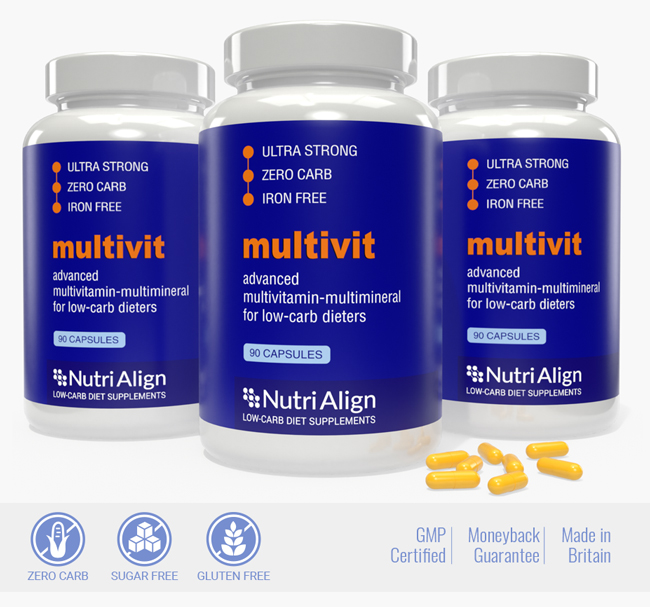 Do you need multivitamins to support your low-carb or Keto diet? Getting all the vitamins you need from low-carb food is possible. After all, many low-carb foods like vegetables, meat and fish are very rich in nutrients.
Do you need multivitamins to support your low-carb or Keto diet? Getting all the vitamins you need from low-carb food is possible. After all, many low-carb foods like vegetables, meat and fish are very rich in nutrients.
But covering all bases is not always easy. It requires planning and effort.
Lack of essential nutrients can derail your diet, no matter how hard you work. So most low-carb experts recommend supplementation, especially in the beginning of your diet.
A multivitamin is a cheap insurance policy against possible deficiencies. It can also make your diet easier, for example, by boosting your energy levels or helping you fight sugar cravings.
Standard multivitamins won’t cover your needs
Despite the growing popularity of Keto, low-carb lifestyle is still niche. Mass-market companies design products for people on a “standard diet”. You know the one – recommended carb intake of around 300g a day, plenty of whole grains and fruit…
Supplements market is no exception. Generic multivitamins usually come with just 100% of the daily recommended values.
These figures (“Nutrient Reference Values” in the UK, “Daily Values” in the USA) are the official government recommendations on the nutrient intake.
However, the research behind these guidelines is decades old. They don’t take into account new nutritional approaches such as Keto. So they are not exactly that relevant.
Another problem is that standard multivitamins are often loaded with sugar, cheap carbohydrate fillers and other junk. This might not make much difference to someone who still eats sugar, but could potentially disrupt your Keto diet.
What’s the right solution to support Keto?
Look for more specialised products. Ideally, find supplements that are designed especially for people on low-carb diets.
To find an optimum multivitamin formula, check that it is:
- sugar-free and carb-free
- iron-free
- contains extra-strong B and C vitamins
- contains electrolytes – potassium and magnesium
Some formulations also include extra ingredients to boost your diet, for example, chromium, green tea extract, piperine, probiotics.
Let’s look at each point in detail.
Sugar-free
The last thing you want on a low-carb diet is a hit of pure sugar with your supplement.
Unfortunately, generic multivitamin products are often sugar-coated. Some include sugar-based fillers like dextrose or maltodextrin.
Although the amount of sugar is small, carbs do add up. Why waste your limited carb allowance on a supplement?
So our number one requirement for a low-carb diet multivitamin – it must be sugar-free and zero-carb.
Iron-free
Iron is an essential mineral. But too much iron can be harmful. Doctors advise caution when taking iron supplements.
Meat and green leafy vegetables are excellent sources of iron. Both are staple foods for low-carb dieters, providing plenty of iron naturally. An additional iron supplement is therefore unnecessary and possibly harmful.
The only exception is vegetarian low-carb diets. (I am not entirely sure how this is even possible but some people manage to pull it off.) Vegetarians should supplement iron, as they don’t get any from meat.
When choosing a multivitamin formula, look for an iron-free product.
Extra-strong B and C vitamins
Whole grains and fruit are high in B and C vitamins, but also high in carbs.
B and C vitamins are essential for the normal functioning of almost all systems and organs in your body. Supplementing these vitamins has additional therapeutic benefits, for example, helping to reduce fatigue and increase energy-yielding metabolism.
Many low-carb diet authors recommend supplementing B and C vitamins with extra-strong dosages.
If you are on a ketogenic diet, with only 20-30g of carbs a day, you could go as high as 2000-3000% of NRV for B and C vitamins.
Electrolytes: sodium, potassium, magnesium
You need to drink lots of water on a low-carb diet, and especially so on Keto. You will most likely feel extra-thirsty anyway.
There is just one issue with drinking lots. It flushes out essential minerals and electrolytes from your system. Depleted electrolytes can result in muscle cramps, headaches and the infamous “Keto flu”.
Your multivitamins should ideally include some electrolytes. Potassium and magnesium are the key ones to replace. You can get extra sodium by adding more table salt to your food.
Minerals have more bulk than vitamins. They are typically measured in mg rather than mcg. So multivitamins can’t include a high dosage of these ingredients. There is only so much space in a single capsule!
If you struggle with symptoms of electrolyte deficiency, you might need to take a standalone Keto electrolyte supplement as well as a multivitamin.
Extra benefits
Specialised multivitamins may also include one or more extra ingredients, known to help with fat-burning metabolism and cravings. Although not a requirement, these nutrients can give your diet an extra boost.
Chromium
Chromium plays a role in regulating glucose, insulin and lipids. Studies indicate that it can reduce hunger and sugar cravings. For this reason, chromium picolinate is a popular supplement amongst dieters. Chromium is often included in multimineral formulas. To get the full benefits, get at least 200µg a day (500% of UK NRV).
L-Carnitine
Carnitine is important for your body’s energy production. It transports long-chain fatty acids into the mitochondria to produce energy, concentrating in tissues that utilise fatty acids as a dietary fuel. Most people don’t need to supplement carnitine. But if you are on a ketogenic diet, L-carnitine supplement can speed up ketosis and boost your fat-burning metabolism.
Co-Enzyme Q10
According to Dr Atkins, Co-Enzyme Q10 works in collaboration with chromium and L-Carnitine to mobilise fat and reduce metabolic resistance. Some multivitamin formulas include CoQ10 in tablet form. You could also try a Co-Q10 L-Carnitine combination supplement.
Green tea extract
Green tea has a strong reputation as a diet aid. Research shows that it helps to control blood sugar, boost fat-burning metabolism, improve energy levels and reduce sugar cravings. It is also a strong antioxidant.
Capsicum, Piperine, Bioperine
Another popular group of diet supplements is spice extracts from the pepper family. Benefits may include improved digestive health, better fat metabolism and increased energy. They improve the absorption rate of other nutrients, and so work well as part of a multi-nutrient supplement.
Probiotics
Probiotics are healthy bacteria that live in your digestive system and help to keep it healthy. When you switch to a low-carb diet, probiotics may help your system to adjust while you get used to eating different types of food.
Multivitamins are not magic weight-loss pills
Multivitamins help to protect your health while you diet. They can help you solve common diet problems, such as tiredness or sugar cravings. This, in turn, would help to make your diet easier. But only if you do the work and stick to your actual diet.
Multivitamins are NOT magic pills to make you lose weight directly. Nothing works like that. Any product that claims otherwise is a fraud. At best, it would be a waste of money and at worst, might actually harm your health.
Other low-carb diet supplements
In addition to your multivitamin, you might also want to consider omega oils, co-enzyme Q10 and fibre supplements. Read more about low-carb diet supplements.
Varied diet
Although supplements can enhance your nutrient intake, they are not a substitute for a varied and balanced diet. On a low-carb diet, the best strategy is to use up your carb allowance on the most vitamin-rich foods.
Try to include the following low-carb high-vitamin foods to your diet:
- Green vegetables: spinach, kale, collard greens, cabbage, asparagus, broccoli, Brussels sprouts
- Salad vegetables: bell peppers, tomatoes, radishes, bean sprouts, spring onions
- Fish and seafood: salmon, mackerel, mussels and other shellfish
- Berries: blueberries, blackberries, strawberries
- Nuts and seeds: hazelnuts, walnuts, sunflower seeds, pumpkin seeds
- Offal meats (I know it’s a bit ew but they are packed with nutrients): liver, kidneys
Don’t forget eggs, sour cream and cheese.
Lemons are low in carbs but packed with vitamin C. Just squeeze a bit of lemon juice to your drinking water.
See our list of top vitamin-rich low-carb foods
Checking claims on supplements
Dietary supplements market is huge. With so many different benefits and health claims listed on each label, how do you know what to trust?
There are some independent sources where you can double-check information about supplements and their health benefits.
EU Register of nutrition and health claims made on foods – the European Union has stricter regulations than the USA when it comes to health claims on supplements. European Food Safety Authority reviews related scientific studies and verifies all health claims used on supplements labels. You can use their online register to check if a claim is authorised.
UK NHS – NHS provides a simple guide to vitamins on their website. When looking at their recommendations, bear in mind that they also assume “standard diet” rather than a low-carb diet.
Examine.com – In-depth guide to all vitamins and minerals, health claims associated with each, and a review of whether available scientific research backs up these claims
Buying low-carb diet multivitamins
Low-carb diet is still niche, and the size of the market is small. Big supplement brands are either not interested, or don’t have the necessary expertise to design products for this small group of consumers.
One massive supplements company (its brand name starts with “C” and ends with “M”) rolled out a low-carb multivitamin about 10 years ago – but it was sugar-coated! It flopped and got discontinued.
Atkins Nutritionals used to produce their own supplements, according to Dr Atkins’ own formulations – such as Atkins Basic 3. Unfortunately, these have also been discontinued.
In recent years, several smaller independent companies started to produce supplements designed exclusively for low-carb dieters.

Maltodextrine in a pill is such a small amount. It doesn’t have any effect on ketose.
Pingback: The Best Multivitamin For A Keto Diet - Learn About Supplements
i cut calories and having issues with energy and feeling unbalanced like a wet noole
Hi April, all materials on this website relate specifically to low-carb diets, rather than low-calorie diets. Are you doing low-carb as well as cutting calories? Generally, you don’t need to do both.
Here’s an article on fighting tiredness on a low-carb diet: https://www.carbophobic.com/low-carb-diet-tiredness/
Pingback: Atkins Basic #3 and Alternative Products | Nutri-Align